
One in three young people in the United States are growing up without a mentor of any kind. Out of the nation’s 24 million youth, one third (or 9 million) have never had a mentor or role model in their lives. These young people are at risk for multiple adverse childhood experiences (ACEs) and other risky behaviors — including poor academic performance, homelessness, delinquency, trauma and behavioral problems. The remaining 15 million youth are engaged with a mentor — whether it be formal or informal.
MENTOR, The National Mentoring Partnership, recognized this gap and has developed a strategy to help adults be more intentional when interacting with the young people in their lives. This strategy, known as a “mentoring mindset,” is part of MENTOR’s Becoming a Better Mentor: Strategies to Be There for Young People which includes four ways adults can support youth in a more purposeful manner:
- Intentional: I See You
- Mantra: I will respect your voice, interests and identity; be fully present in our interactions; and share my story with you. I commit to being self-reflective.
- Supportive: I Got You
- Mantra: I will be curious about you and your journey, be consistent in showing up, and collaborate with you to create a safe and healthy space for us.
- Developmental: I’m Here to Help
- Mantra: I will practice strength-based approaches that challenge and support you and your growth, and contribute to goals that are meaningful to you.
- Communal: We’re in This Together
- Mantra: We will teach and learn from each other, leveraging networks and resources for the mutually beneficial growth of ourselves as individuals, our relationships and our communities.
Why is it important for park and recreation professionals to adopt a mentoring mindset? We are one of the largest providers of youth development services nationwide. More than 9,000 park and recreation agencies offer high-quality recreational programming for youth, families and communities — reaching 40 million children annually. This is second to the public school system, which reaches 50 million youth each year.
Recognizing this, NRPA continues to support efforts to expand mentoring opportunities through parks and recreation by providing the field with training, guidance, resources and professional development including in-person and virtual learning events. This helps advance an agency and community-wide “mentoring mindset.” Park and recreation professionals are regularly interacting with youth in a variety of roles — youth sports coaches, afterschool and summer program leaders, employers, environmental educators, etc. Applying a mentoring mindset and equipping park and recreation professionals with additional skills, competencies and confidence to serve as mentors in these roles provides another opportunity to advance social-emotional learning and positive youth development.
On NRPA’s Mentoring Resources page, we are excited to announce the addition of several new resources that contribute to the advancement of youth mentoring programs and youth development:
-
Best Practice Guide
Mentoring in Parks and Recreation: A Best Practice Guide serves park and recreation professionals looking to implement a new mentoring program or to improve an existing program in the community. These best practices build upon MENTOR’s Elements of Effective Practice for Mentoring™ (recruitment, screening, training, matching, and initiating, monitoring and support, and closure) and are tailored specifically for parks and recreation. Key themes include the establishment of the program, partnerships, program staffing, recruitment and matching, and program evaluation. -
Mentor Training Resource
With parks and recreation providing ample opportunities for formal and/or informal mentoring, the Mentor Training Resource serves as a key component in supporting the development and implementation of a mentoring program in your community. This guide provides park and recreation professionals who are implementing youth mentoring programs with the tools and skills necessary to successfully train additional staff and community members to serve as mentors.
Forthcoming resources include a set of supplemental materials focused on family engagement, career pathways, community services and closure in the mentoring relationship. Stay tuned for more as we expand our suite of offerings!
Lauren Kiefert, MPH (she/her), is an NRPA Program Manager

